
The politics of Hong Kong takes place in a framework of a political system dominated by its quasi-constitutional document, the Hong Kong Basic Law, its own legislature, the Chief Executive as the head of government and of the Special Administrative Region and of a politically constrained multi-party presidential system. The Government of the Hong Kong Special Administrative Region of the People's Republic of China is led by the Chief Executive, the head of government.

The Basic Law of the Hong Kong Special Administrative Region of the People's Republic of China is a national law of China that serves as the organic law for the Hong Kong Special Administrative Region (HKSAR). Comprising nine chapters, 160 articles and three annexes, the Basic Law was composed to implement Annex I of the 1984 Sino-British Joint Declaration.

Elections in Hong Kong take place when certain political offices in the government need to be filled. Hong Kong has a multi-party system, with numerous parties in the Legislative Council. The Chief Executive of Hong Kong is nonpartisan but can work with several parties to form a coalition government.

Ronny Tong Ka-wah is a senior counsel and politician in Hong Kong. He is a current non-official member of the Executive Council of Hong Kong. He co-founded the Civic Party and was a member of the Legislative Council of Hong Kong, representing the New Territories East constituency from 2004 until he quit the party and resigned from the legislature on 22 June 2015, following the historic vote on Hong Kong electoral reform a few days earlier, having switched his political alignment from pro-democracy to pro-Beijing Hong Kong political group Path of Democracy, of which he is currently the convener.

Audrey Eu Yuet-mee is a Hong Kong lawyer and politician who represented Hong Kong Island in the Legislative Council of Hong Kong from 2000 to 2012. Eu was the founding leader of the Civic Party and was a member of the party's executive committee, focusing on party development. In politics, Eu has focused on matters relating to the Basic Law.
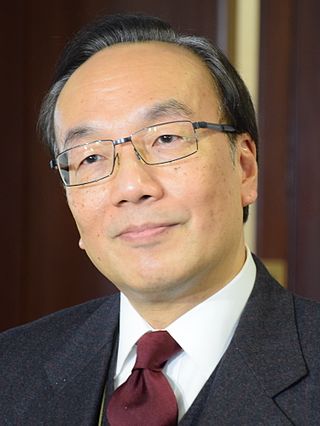
Alan Leong Kah-kit, SC is a former member of the Hong Kong Legislative Council, representing the Kowloon East geographical constituency and former chairman of the now-disbanded Civic Party. He was also vice-chairperson of the Independent Police Complaints Council.

The pro-democracy camp, also known as the pan-democracy camp, is a political alignment in Hong Kong that supports increased democracy, namely the universal suffrage of the Chief Executive and the Legislative Council as given by the Basic Law under the "One Country, Two Systems" framework.
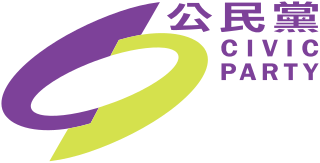
The Civic Party (CP) was a pro-democracy liberal political party from March 2006 to May 2023 in Hong Kong.

Democratic reforms in Hong Kong did not seriously begin until 1984 and has faced significant challenges since 2014. The one country, two systems principle allows Hong Kong to enjoy high autonomy in all areas besides foreign relations and defence, which are responsibilities of the central government. Hong Kong's Basic Law allows residents to vote for local district councillors.
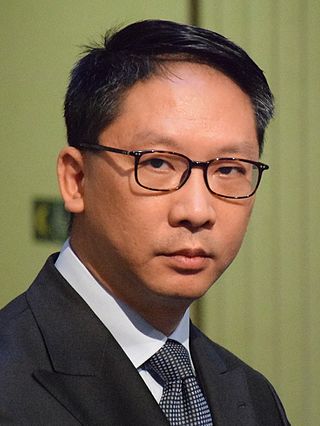
Rimsky Yuen Kwok-keung is a barrister who served as the third Secretary for Justice of Hong Kong from 2012 to 2018.

The 2010 Hong Kong Legislative Council by-election was an election held on 16 May 2010 in Hong Kong for all five geographical constituencies of the Legislative Council (LegCo), triggered by the resignation of five pan-democrat Legislative Councillors in January of the same year.
The 2010 Hong Kong electoral reform was the series of events began in 2009 and finalised in 2010 under the Consultation Document on the Methods for Selecting the Chief Executive and for Forming the Legislative Council in 2012, a document published on 18 November 2009 by the Government of Hong Kong to broaden the scope of political participation and increase the democratic elements in the 2012 elections in line with the Hong Kong Basic Law.

The Third Legislative Council of Hong Kong was the meeting of the legislative branch of the Hong Kong Special Administrative Region Government. The membership of the LegCo is based on the 2004 election. The term of the session was from 1 October 2004 to 30 September 2008, during the second half of the Tung Chee-hwa's administration until his resignation in 2005 and was replaced by Donald Tsang for the rest of the term, and also the beginning of the third term of Chief Executive after Tsang won in the 2007 Election. The Democratic Alliance for the Betterment of Hong Kong (DAB) became the largest party with 10 seats. Notable newcomers to the Legislative Council included Leung Kwok-hung, Alan Leong, Ronny Tong, Albert Cheng, and Jeffrey Lam.
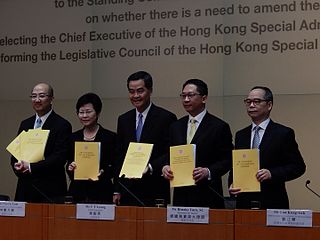
The 2014–2015 Hong Kong electoral reform was a proposed reform for the 2017 Hong Kong Chief Executive election and 2016 Legislative Council election.

Alvin Yeung Ngok-kiu is a Hong Kong barrister and politician. He was formerly the leader of the Civic Party and a member of the Legislative Council of Hong Kong, representing New Territories East after winning the 2016 by-election. On 11 November 2020, Yeung was disqualified from the Legislative Council, along with three other lawmakers of the pan-democratic camp, by the central government in Beijing on request of the Hong Kong government. A mass resignation of pan-democrats the same day left the Legislative Council without a substantial opposition.
The 2005 Hong Kong electoral reform was carried out in late 2005 for the selection of the Chief Executive of Hong Kong (CE) in 2007 and Legislative Council of Hong Kong (LegCo) in 2008. The reform proposals were ultimately voted down by the pro-democracy camp.
Liberalism in Hong Kong has become the driving force of the democratic movement since the 1980s which is mainly represented by the pro-democracy camp which strives for the universal suffrage, human rights and rule of law in Hong Kong. It is one of two major political ideologies of the Hong Kong, with the other being conservatism. The emergence of the contemporary liberalism took root in the rapid democratisation in the final years of the colonial years in the 1980s and 1990s, which the pro-democracy camp was united under the banner of an autonomous Hong Kong under Chinese sovereignty. The liberals consolidated their popular support from the 1989 Tiananmen Square protests and massacre and received landslide victories in the first direct elections in 1991 and 1995 in the final colonial years. The liberals took the defensive role against the Beijing's authoritarian regime going into the early SAR period which led to the massive demonstration against the Basic Law Article 23 in 2003.

Path of Democracy is a political group and think tank established in 2015 in Hong Kong. It is led by former Civic Party legislator Ronny Tong, who joined the Executive Council on 1 July 2017. Although officially unaligned with either the pro-Beijing camp or the pro-democracy camp, the group has been supportive of the policies and legislation put forward by the former, and was considered by the media to be pro-Beijing by 2021.
The Decision of the Standing Committee of the National People's Congress on Issues Relating to the Selection of the Chief Executive of the Hong Kong Special Administrative Region by Universal Suffrage and on the Method for Forming the Legislative Council of the Hong Kong Special Administrative Region in the Year 2016, commonly known as the 31 August Decision, is a decision made by the Standing Committee of the National People's Congress (NPCSC), the national legislative body of the People's Republic of China (PRC) on 31 August 2014 which set limits for the 2017 Chief Executive election and 2016 Legislative Council election in the Hong Kong Special Administrative Region (HKSAR).
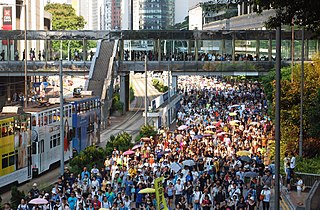
On 17 August 2017, three Hong Kong pro-democracy activists, Alex Chow, Nathan Law and Joshua Wong, were given prison sentences by the Court of Appeal for their roles in a protest at the Civic Square in front of the Central Government Complex in Tamar, Admiralty, on 26 and 27 September 2014. The events at the Civic Square helped set off massive pro-democracy protests, sometimes referred to as the Umbrella Movement, which lasted until police cleared the last of the protest sites in December 2014.














